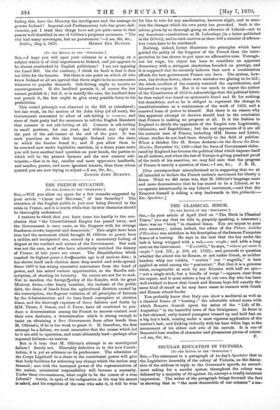THE FRENCH SITUATION.
[TO THE EDITOR OF THE "SPECTATOR."]
you allow me space for a few remarks suggested by your article " Cmsar and Mmzenas," of last Saturday? The attention of the English public is just now being directed to the crisis in France, and it is worth while that its true character should be thoroughly understood.
I venture to think that you have come too hastily to the con- clusion that "the Constitutional Empire has passed away, and the Government is once more, as the Emperor with his strange frankness avows, imperial and democratic." This might have been true had the movement which brought M. 011ivier to power been a sudden and unexpected one, caused by a momentary feeling of disgust at the conduct and nature of the Government. But such was not the case, as all who have attentively watched the history of France of late years are aware. The dissatisfaction which reached its highest point a fewlmonths ago is of ancient date ; it has shown itself each election more deep-seated and wide-spread. Since 1860 it has wrung successive concessions from the hand of power, and has seized various opportunities, as the Baudin sub- scription, of showing its intensity. Its causes are not far to seek. Not to mention the foreign:policy of the Empire, with its great Mexican fiasco,—the heavy taxation, the increase of the public debt, the drain of hands from the agricultural districts caused by the conscription, the flagrant violation of all principles of fairness by the Administration and its bare-faced corruption at election times, and the thorough exposure of these failures and faults by MM. Thiers, J. Simon, and J. Favre, have all combined to pro- duce a determination among the French to recover control over their own destinies, a determination which is strong enough to insist on obtaining a free Government from other hands than M. 011ivier's, if he is too weak to grant it. If, therefore, the first attempt be a failure, we must remember that the causes which led to it are still in operation, and must ultimately lead—perhaps after repeated failures—to success.
But is it true that M. 011ivier's attempt is an unmitigated failure? Surely not. Miserably defective as is the new Consti- tution, it is yet an advance on Its predecessor. The admission of the Corps Legislatif to a share in the constituent power will give that body facilities for enforcing any change which the nation may demand ; and with the increased power of the representatives of the nation, ministerial responsibility will become a necessity. Under these circumstances, what ought to be the course of a true Liberal? Surely, in spite of his indignation at the way his assent is asked, and his suspicion of the man who asks it, it will be wise
for him to vote for any amelioration, however slight, and to sanc- tion the changes which his own party has provoked. Such is the advice given by so thorough-going an advocate of Liberal—not to say American—institutions as M. Laboulaye (in a letter published in the Delats), and to such motives as these will a number of affirma- tive votes have to be attributed.
Nothing, indeed, better illustrates the principles which have guided the policy of the Emperor of the French than the inter- pretation be has chosen to put upon an affirmative vote. Through- out his reign, his object has been to conciliate an apparent democracy with a stringent absolutism founded on prestige, and it is supposed that he sincerely believes that such a combination affords the best government France can have. The system, how- ever, has broken down ; there were mistakes too glaring to be hid ; the whole intellect of the country resented the mystification, and laboured to expose it. But it is too much to expect the author of the Constitution of 1852 to acknowledge that the political fabric he then raised was based on systematic fraud and fit for nothing but demolition, and so he is obliged to represent the change to constitutionalism as a continuance of the work of 1852, and a renewed lease of power to himself. But there is no reason why this apparent attempt to deceive should lead to the conclusion that France is making no progress at all. It is the fashion in England to divide the opponents of the Empire into Legitimists, Orleanists, and Republicans ; but the real opponents of it are all the eminent men of France, including MM. Renan and Littre, whose studies do not lead them directly to the field of politics. When a thinker like M. Renan declares—in the Revue des Dena: Mondes, November 15, 1869—that the form of Government elabo- rated by England has become the political ideal which imposes itself on all nations, and when the rest of Europe is giving practical proof of the truth of his assertion, we may feel sure that the progress of France is merely a question of time.—I am, &c., J. R. H.
[Our correspondent misunderstood us in supposing that we at all intended to declare the French nation's movement for liberty a fiasco. What we did mean was, that M. 011ivier's language more and more demonstrates that he has ceased to be a Liberal, or to co-operate intentionally in any Liberal movement,—and that the Emperor himself is taking a step backwards in this plibiscite.— ED. Spectator.]






























 Previous page
Previous page